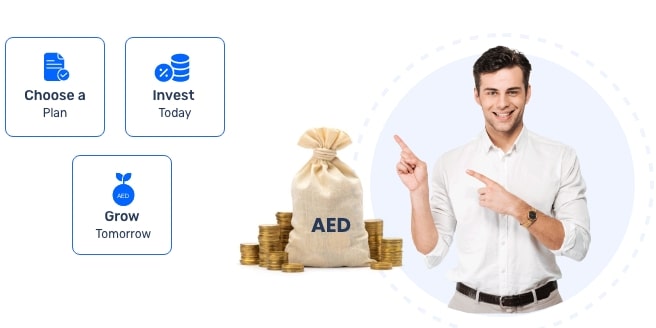How to Invest in Mutual Funds in UAE?
Investing in mutual funds is one of the most accessible and effective ways to grow your wealth in the UAE. Whether you're a first-time investor or looking to diversify your existing portfolio, mutual funds offer professional management, diversification, and affordability—all in one place.
What is a Mutual Fund?
A mutual fund pools money from multiple investors and invests it in a diversified portfolio of securities such as stocks, bonds, money market instruments, and other assets. This portfolio is managed by professional fund managers on behalf of investors.
When you invest in mutual funds online, you’re buying units or shares of the fund, which represent a portion of ownership in the underlying assets.
In simpler words:
- Think of it like a basket (the fund) filled with different fruits (stocks, bonds, etc.).
- You own a piece of the basket and benefit from how well the contents perform collectively.
Best Investment Plans in UAE
Some of the best Investment quotes in UAE & Dubai are:
Why Invest in Mutual Funds in the UAE?
Mutual funds investment in the UAE is growing in popularity for a number of compelling reasons —
| Benefit | Description |
|---|---|
| Professional Management | Your funds are managed by experts who analyse markets and make investment decisions. |
| Diversification | Exposure to various asset classes, sectors, and geographies reduces overall risk. |
| Liquidity | You can redeem units anytime (depending on the fund type), ensuring easy access to cash. |
| Affordability | Start investing with relatively low capital. SIPs make it even more accessible. |
| Currency Hedging | Many funds invest in USD, protecting you from local currency depreciation. |
| Tax Efficiency | Most mutual fund investment plans in the UAE are free from capital gains tax. |
| Goal-based Planning | Choose funds based on specific financial goals like retirement, home purchase, or education. |
Types of Mutual Funds Available in the UAE
Choosing the right mutual funds investment depends on your financial goals, investment horizon, and risk appetite —
| Type | Focus | Best For |
|---|---|---|
| Equity Funds | Invest in shares of companies | Long-term wealth creation |
| Bond Funds | Invest in fixed-income instruments like government or corporate bonds | Stable income with moderate risk |
| Money Market Funds | Short-term, low-risk instruments like treasury bills or deposits | Parking funds for short periods |
| Balanced/Hybrid Funds | Mix of equity and debt for balanced growth | Medium-term goals and moderate risk |
| Commodity Funds | Invest in assets like gold, oil, or silver | Hedging against inflation |
| Target Date Funds | Adjust allocation based on a specific future date (e.g., retirement) | Planning for a milestone or event |
How Do Mutual Funds Work?
Each mutual fund has a specific investment objective, which guides where and how your money is invested.
For example, a Technology Fund may aim to invest 70% or more of its assets in global tech companies. Based on this goal, the fund manager selects relevant securities. If you're looking at how to invest in mutual funds in UAE, it's important to first understand the fund's objective, risk profile, and potential returns before making a decision.
What is NAV?
The Net Asset Value (NAV) is the price per unit of a mutual fund. It is calculated daily based on the total market value of assets by subtracting liabilities.
- If the fund's investments perform well, the NAV rises.
- If the investments fall, the NAV decreases.
Your returns depend on how the NAV changes from the time you invest to the time you redeem.
How Do Mutual Funds Generate Returns?
Mutual funds can offer returns in three major ways —
-
Capital Gains
- If the securities in the fund rise in value, the overall fund gains.
- Profits from selling those assets at higher prices are distributed to investors or reinvested
-
Dividends
- Stocks in the fund may pay dividends, which can be reinvested or paid out to you.
- Stocks in the fund may pay dividends, which can be reinvested or paid out to you.
-
Interest Income
- Bonds or fixed-income instruments in the portfolio earn interest, which also contributes to your return.
- Bonds or fixed-income instruments in the portfolio earn interest, which also contributes to your return.
-
Derivative Gains (if applicable)
- Some funds use options or futures to boost performance, but this introduces additional risk.
Pre-Investment Checklist for UAE Investors
Before you invest in mutual funds in the UAE, consider the following —
- Assess Your Current Financial Position – Make sure you’ve cleared high-interest debt and have an emergency fund (3–6 months’ expenses).
- Set Financial Goals – Define what you're investing for—retirement, education, house down payment, etc.
- Evaluate Risk Tolerance – Understand how much volatility you’re willing to accept.
- Choose Fund Type – Equity for long-term growth, bonds for safety, hybrid for a mix, etc.
- Understand Fees – Look into expense ratio, entry/exit load, and advisory fees.
Step-by-Step: How to Invest in Mutual Funds in Dubai
If you're wondering how to buy mutual funds in UAE, here’s a simplified roadmap —
Step 1: Open an Investment Account
Start by choosing a trusted investment platform. This could be a bank, licensed brokerage, or wealth advisory firm operating in the UAE.
✅ Tip: Ensure the institution is regulated by the Securities and Commodities Authority (SCA) or an equivalent authority. This is a key step if you're wondering how to invest in mutual funds in UAE.
Step 2: Complete Your Investor Profile (KYC)
You’ll need to undergo a Know Your Customer (KYC) process and fill out a risk profiling questionnaire.
✅ Tip: Be honest with your risk profile—it ensures you’re matched with suitable mutual fund investment plans.
Step 3: Select Mutual Funds Based on Your Goals
Once your profile is ready, explore a range of mutual fund investment plans aligned with your financial objectives. You can choose from Equity funds, Debt or bond funds, Balanced funds, and International funds.
✅ Tip: Use filters like fund rating, past performance, asset allocation, and expense ratio to shortlist the right ones.
Step 4: Choose Your Investment Mode – SIP or Lump Sum
Now decide how you want to invest your money: in SIP (Systematic Investment Plan) – or Lump Sum.
✅ Tip: SIPs help average out market volatility and encourage disciplined investing.
Step 5: Monitor, Review, and Rebalance Your Portfolio
Once invested, don’t just set it and forget it. Track your portfolio performance periodically (every 6–12 months) and rebalance or make adjustments when needed.
✅ Tip: Consider using portfolio tracking apps or consulting a financial advisor for periodic reviews.
SIP vs Lump SumSIP: Invest small amounts monthly; good for rupee-cost averaging and budget planning. Lump Sum: Best for large one-time capital and long-term goals. |
|---|
Top Global Mutual Fund Providers Available in the UAE
You can invest in mutual funds offered by some of the most reputed global asset managers —
|
Company |
Assets Under Management (AUM) |
|---|---|
|
BlackRock |
$11.58 trillion |
|
Vanguard |
$10.4 trillion |
|
Fidelity |
$15 trillion |
These firms offer a wide range of funds across equity, debt, hybrid, and thematic categories.
Is Mutual Fund Investing Right for You?
Mutual funds suit a wide range of investors, but it's crucial to consider certain things when searching for how to buy mutual funds in UAE —
- Your investment horizon (5–10 years recommended for equity).
- Risk appetite (conservative, balanced, aggressive).
- Fee structure (low-cost index funds vs actively managed funds).
- Fund objective and sector exposure (technology, healthcare, ESG, etc.).
Always read the Product Factsheet and Key Investor Information Document (KIID) before investing.
Conclusion: Start Investing with a Purpose
Whether you're just learning how to buy mutual funds in UAE or looking to refine your portfolio, mutual funds offer a smart, flexible, and professional approach to wealth creation. From Dubai to Abu Dhabi, you can now invest in mutual funds online through trusted platforms and advisors.
Frequently Asked Questions
Some popular mutual fund investments in the UAE include Fundsmith Equity Fund, Fidelity Emerging Markets Fund, Schroder ISF US Large Cap, and Invesco Perpetual Asian Fund. The right one depends on your goals and risk appetite.
Start by identifying your financial goals, risk tolerance, and how long you want to invest. Then, pick funds that match those needs based on past performance, asset mix, and investment strategy.
Yes, mutual funds offer diversification and professional management, which can reduce risk and grow your money over time. They are a good option for most investors.
Yes, you can set up a Systematic Investment Plan (SIP) to invest a fixed amount regularly. This helps build wealth steadily and removes the pressure of market timing.
Yes, most mutual fund investments can be managed online and continued even if you move out of the UAE.
Yes, Shariah-compliant mutual funds are available in the UAE. These funds avoid non-halal industries and invest in halal assets like equities and sukuk.
Know More About Other Insurance Product
More From Investment
- Recent Articles
- Popular Articles






















